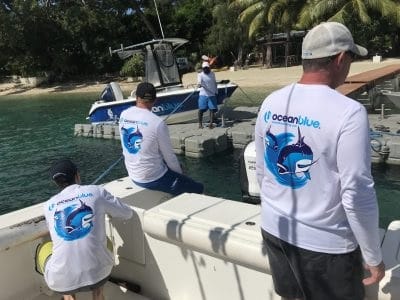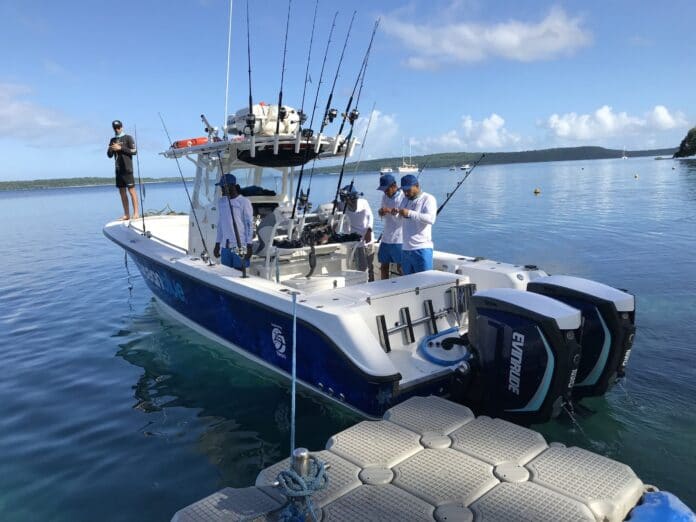As fishing guides, we always want to provide our guests with the best experience possible with what the conditions can offer. Here’s what we do on the daily and what you can also add to your agenda when fishing on your own.
In a pristine saltwater environment like Vanuatu fishing, we sometimes forget that fishing is still fishing, and catching a fish cannot be guaranteed. With all the excitement going about the lodge when a big group comes in, a fishing guide needs to focus on preparing the fishing essentials needed to ensure an epic day out on the water. As guides, we spend 90% of our time either on the water or preparing for the next day’s fishing session.
Checking the Weather Forecasts
Although not 100% accurate all the time, we always check the weather forecast and plan around it. Checking the weather at least a week in advance then checking daily for changes in the forecast can make or break a fishing trip. Bad weather warnings or forecasts allows us to adjust fishing dates to offer the best results, if the guests haven’t booked their flights yet. The last thing we want is guests flying in during a hurricane.
Apart from the normal weather forecasts, we take the moon phases into consideration too. We won’t go much into detail here but always remember when there’s no run, there’s no fun. A good amount of current can bring more success on a fishing boat. Current will act like a bait conveyor belt. Good current plus good structure will lead you to a better day’s fishing. Too much current can be detrimental to the fishing too, so find out what your local fishing hole’s behavior is during different moon phases and keep a logbook of which days produced most fish. You’ll soon figure out the pattern and you’ll be making the most out of your fishing time sooner than later.
“Safety is never to be forgotten.”
Boat Preparation
The fishing boat is the guides’ office. We want it clean and spotless at all times albeit almost impossible to do so. We want it to be running smoothly with no rattles and creaks to be heard, also almost impossible to perfect. Preventive maintenance done on a regular schedule, oil changes, spark plugs, impellers, water pumps, starter motors, all need to be checked on the regular. Apart from the mechanical aspects of the boat, we also want our electronics to be working well too. GPS and sounder units are to be checked daily (if you fish daily). Wired connections are to be checked for wear and replaced if needed. Terminals to be checked for saltwater damage and corrosion. Transducers checked if still sound and solidly attached to the boat.
Safety is never to be forgotten. Check all safety equipment from first aid kits, emergency flares, life jackets, EPIRBS and bilge pumps. You may want to consider a manual human powered bilge pump stored in your boat for emergency purposes if you have the space to spare.
Tackle Preparation
We start by talking with our guests and planning our fishing in advance. Most guests will have a bucket list of fish that they want to catch, and we can plan on how to accomplish these goals if the conditions allow. We may change the plans in accordance to what’s biting at the time of your arrival, but we always consider what you want to catch.
Depending on targeted species and preferred fishing techniques, we will rig tackle accordingly a couple of days before the first day of fishing. Trolling skirts and lures rigged up and ready, poppers and stickbaits re-rigged with new hooks, braid checked, and leaders replaced. If you bring your own tackle, don’t hesitate to ask for some help to rig up right.
Proper Clothing is Essential
Being exposed under the elements virtually all the time requires some sort of protection. Truly, proper fishing clothing is essential. Long sleeved shirts are the way to go for maximum skin coverage. Having a good collection of buffs or face masks are also essential for keeping our face, ears and neck covered from the harmful UV rays. We also have a big hat collection at home and having good hats help with the fishing heaps. Glare reduction from the brim helps us to sight more signs of fish. And of course, polarized sunnies are a must. Different lens colors for different light conditions are ideal, but we use what we have.
Having a good rain jacket stored under the hatch is a great thing. We’ve been drenched in rain and exposed to cool winds far too much and have since appreciated the heavenly touch of the simple rain jacket.
Food and Drinks
We’ll pack the food and drinks for the next day’s fishing and having a list of allergies or favorite drinks can help heaps. We usually pack according to the guests requirements and beer requests are of much importance. If you haven’t sent us your beer orders yet, better get on your computer now and send us this most important email.
Cameras
All batteries to be fully charged, all SD cards formatted and ready. We will try our best to get great photos for you and of course for our Instagrams, so rest assured that we’ll have our cameras ready for the hero shot. Bring your cameras along too and we can swap photos and videos at the end of the trip!
Tools and Accessories
Our trusty fishing pliers have to be oiled and ready to use. Bolt cutters in case of emergencies are also checked and stored where it is easy to reach. A couple sets of gloves in the center console hatch and in our pockets clean or not, shouldn’t be forgotten. Fillet knives sharpened and ready to gut and prep fish the guests want to eat at dinner is also a priority. Fish bags filled up with ice ready to welcome the day’s catch.
These tasks above are some of the most important steps we make sure we do before every fishing trip here in Vanuatu. We’ll make sure that you get the very best possible trip that we can manage, and we can only hope that the fish will cooperate!
Hope you guys can pick up a few things from the stuff above to add to your fishing preparation list to help improve the trips to your local fishing hole or even on your next big fishing trip.




